Surprise! Blank Check has started a newsletter! Your favorite connoisseurs of context are gonna go on even more tangents, commit to even more bits, and share opinions on even more pieces of entertainment industry news because - hey, why not. Thanks for joining us!
IN THIS WEEK’S EDITION:
Sign up for Regal Unlimited to maximize your moviegoing! Use code BLANKCHECK to get 10% off your 3-month subscription.
THE BARDI PARTY REPORT
Part of the our desire to start a newsletter came out of us wanting to engage further with the bigger cultural ecosystem. Many of our David Lynch episodes were recorded months in advance, so they’re somewhat frozen in amber. Twitter used to be the “Town Square of the Internet,” but now it’s a new circle of Hell rife with porn bots and cryptofascists, leaving a vacuum for our timely takes. Enter Check Book: a repository for our thoughts on such stirring news items as “David Fincher to Direct an English-Language Adaptation of Squid Game for Netflix” (insert fart noise/sad trombone/Kevin-Spacey-as-Frank-Underwood skeptical-glance-into-the-camera here).
So, what is going on in the film industry this week? Well…Robert Zemeckis gave an interview where he implied that in today’s climate Jessica Rabbit couldn’t have giant tits because of woke. Clint Eastwood’s Juror #2 is the subject of a grassroots campaign, with late-style heads across America packing theaters and plotting revenge against David Zaslav. Quentin Tarantino refuses to watch Dune but loved Joker Folie à Deux. Oh, whatever.
I’m gonna be honest with y’all. I’ve had a hard time focusing on Hollywood this week. Maybe you’re in the same boat. I put on The Straight Story and my initial reaction was, “Damn. Wisconsin is a swing state. Is Iowa in play?” I’m in election hell.
So, to jostle myself out of this stupor, I turned to one of the more stirring figures in the Blank Check pantheon:
That’s right—I watched 2008’s misguided Kevin Costner vehicle Swing Vote this afternoon.
Folks, this movie is insane. Insane. Kevin Costner plays Bud Johnson, a deadbeat, alcoholic loser from a town called Texico, New Mexico, (I assure you, a real place) whose precocious tween daughter commits voter fraud when her drunk loser dad doesn’t show up to the polls. Chaos ensues when Bud’s (but really, his daughter’s) ballot gets caught in the scanner as the power cuts out, making said ballot the deciding factor for New Mexico’s evenly-split voting results. Kelsey Grammar naturally plays the tastefully subdued incumbent Republican President (another reason why you can tell this film was made in 2008), with Waterworld’s Dennis Hopper as the Democratic challenger (note: probably unintentional, but Hopper’s speaking cadence is not dissimilar to Joe Biden’s). Both descend upon Texico, New Mexico to convince our booze-addled protagonist to recast his vote in their respective directions. He’s tragically uninformed, and thrilled by all the attention.
The Republicans get Nascar legend Richard Petty to chauffeur Bud and his daughter to Air Force One where President Kelsey Grammar lets him hold the nuclear football (which Bud thinks is a real football). The Dems get Willie Nelson to show up and Dennis Hopper pretends to speak Bass Pro Shop lingo. There is a contractually-obligated performance by Kevin Costner’s band Kevin Costner and the American West. Both Grammar and Hopper create ludicrous TV ads to appeal to Bud’s vaguely defined positions. In one ad, Grammar films a surreal gay marriage endorsement in front of the giant flag from Patton. In another, Hopper crafts an anti-choice spot in which children spontaneously combust on a playground.
The film’s politics are very surface-level, espousing bothsidesism in a way that feels extremely 2008. It’s also in line with Costner’s own inscrutable leanings: Is Yellowstone conservative? Is Dances With Wolves progressive? Did anyone see that Black or White movie? As discussed in our Costner series, the man has admittedly voted for Republicans, but he also voted for Obama, and he’s a fan of Mayor Pete. He has yet to endorse anyone this election cycle.
Partisanship aside, the one thing Kevin Costner stands for is AMERICA, and at the end of Swing Vote, he gives a big ol’ speech that wouldn’t have been out of place at the statue dedication ceremony at the end of The Postman. Democracy is important, every American opinion is important, and Kevin Costner is important because he speaks for every American opinion. We don’t see who he ends up voting for at the end of the movie, but it’s almost a moot point. Civic engagement - aka, CARING ABOUT AMERICA - is what’s important.
Anyway, you couldn’t make this movie today because Costner’s character would absolutely be MAGA-pilled. Dude is textbook Jan 6th coded.
That being said - go vote.
Speaking of swing states…
JJ’S WISCONSIN CORNER by JJ Bersch, PhD.
When Marie told me that this inaugural issue of Check Book should include a “JJ’s Wisconsin Corner,” I was, of course, thrilled. Aside from a few years spent away in Illinois for college, I have lived in Wisconsin my entire life, first in the Milwaukee area and now—for over a decade—in Madison, the home town of The Straight Story writers Mary Sweeney and John Roach. I love this state, and I am proud to call it home. But as soon as I got over the initial shock that resulted from my Coastal Elite bosses providing such a prominent stage for a little voice from the Heartland, I grew stressed over how I might use it. This was sure to be Wisconsin’s biggest moment in the spotlight during the first week of November 2024—what could I possibly do to showcase how special it is?
Well, the most obvious answer was probably that I should provide some more fun details about David Lynch’s time in the Badger State.
Following the contentious premiere of Twin Peaks: Fire Walk with Me at the 1992 Cannes Film Festival, Lynch and Sweeney decamped for Madison, where they spent a little over a month at Sweeney’s parents’ house on Lake Mendota. By summer’s end, Sweeney and Lynch had bought their own home on the Lake. While spending summers in Wisconsin’s capital city, Lynch passed his time by, as Sweeney says, going “to the hardware store with the guys,” following the trial of noted Lost Highway influence OJ Simpson, and working at Tandem Press, a University of Wisconsin-affiliated publisher of fine art prints. (You can find a collection of Lynch’s prints from this era on Tandem’s website.) He also told the Milwaukee Journal Sentinel that he liked to “boat and hang out” and sometimes “play golf.”
Despite his reputation for humble—if not gross—routinized eating, Lynch was also a noted fan of the pioneering James-Beard-Award-winning farm-to-table restaurant L’Etoile, which Lynch called, “high art in food” and “unbelievably beautiful food.” His favorite dish, according to founding chef Odessa Piper, was “chicken with cherry cream sauce. ... It's a Door County cream sauce. With mashed potatoes,” though once Lynch “went on a weird celebrity West Coast diet he hated and couldn't have the cherry sauce.”
One of the first bits of Madison lore you learn as a cinephile living in the city is that David Lynch was rumored to have, of the many bars in town, one favorite: Le Tigre Lounge. Le Tigre resides in an unassuming strip mall located just off the Beltline Highway, but inside, the red-lit, cash-only bar contains an awe-inspiring collection of tiger-centric décor that includes tiger-stripe wallpaper, stuffed tigers of varying sizes, and a horde of tiger paintings, figurines, and photographs, as well as a vintage jukebox stocked with a vast array of oldies. The bar’s combination of unmitigated kitsch and retro stylings make it easy to see why the rumors about Lynch’s association persist. (The bar’s current owner offers no comment on whether Lynch ever actually frequented the Lounge.)
But there are other ways I could fill this space, too, like reminding readers that The Straight Story isn’t the first time Blank Check has covered a film set or shot in Wisconsin. There was, of course, UW-Madison alum Michael Mann’s 2009 film Public Enemies, which kicked off its production in Columbus, Wisconsin, before marching through a ton of the state’s other cities, including Madison, Milwaukee, Oshkosh, Beaver Dam, and Darlington, among others. And when the cast and crew of Sam Raimi’s 1998 film A Simple Plan discovered there was no snow in Delano, Minnesota, due to El Niño, the production quickly relocated to Ashland, Wisconsin, where there was, arguably, too much snow. While star Bill Paxton was charmed by the rural town, Raimi found Ashland to be “so personal, it was kind of freaky.” Though it wasn’t shot in Wisconsin, Starman’s, uh, Starman did crash land in Northern Wisconsin’s Chequamegon Bay. And Jodie Foster’s character from Contact was born in Madison.
I suppose I could also spend some time hypothesizing about which potential future episodes would give me a chance to further rhapsodize about my beloved home. Were you aware that Michael Bay’s 2011 film Transformers: Dark of the Moon converted Milwaukee’s most iconic piece of architecture—Santiago Calatrava’s Quadracci Pavilion at the Milwaukee Art Museum—into Patrick Dempsey’s character’s fancy personal garage?
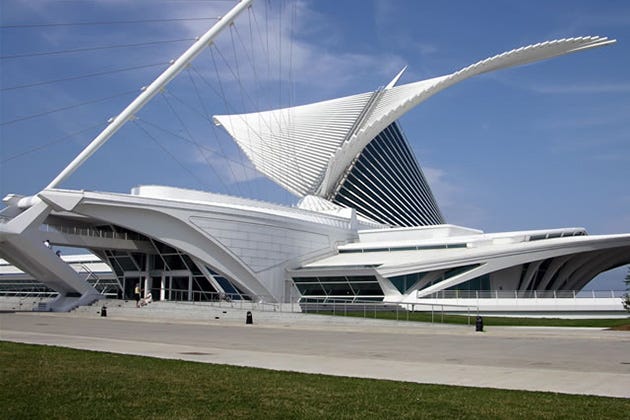
If we finally let Ben shepherd us through a David S. Ward miniseries I could interview my parents about their experience serving as extras at the County Stadium shoot for 1989’s Major League. (And if we ever do Charles Stone III I was there for the Miller Park shoot of 2004’s Mr. 3000.) A Hitchcock series would necessitate a brief mention of Psycho-inspiration Ed Gein. Who could say no to a 54-film Werner Herzog miniseries when it includes 1977’s Plainfield, Wisconsin-shot Stroszek? Andrew Davis’s 1996 film Chain Reaction subbed in the Wisconsin Capitol for DC’s! Green Bay native Zack Snyder set his 2004 Dawn of the Dead remake in the Milwaukee area!! And friend of the show Kevin Smith’s 1999 film Dogma banishes its fallen angels from Heaven to Wisconsin— also widely known as Heaven on Earth!!! No real banishment in my view!!!!
And did you know that famous movie people are sometimes born—and even raised—in Wisconsin? Willem Dafoe? Where else could he be from except Appleton, baby! Mark Ruffalo? The pride of Kenosha, along with Orson Welles! Nicholas Ray? There’s never been a man who’s screamed Galesville, Wisconsin, more than the director of Rebel Without a Cause! Or, even though Griffin used this week’s episode to question my qualification to do so on the basis of my veganism and sobriety, it still might be fun if I shared a bit of Wisconsin culture with you all. Did you know that Wisconsinites (correctly) identify what you (incorrectly) call a “drinking fountain” as a “bubbler”? Or that large swaths of the state use the Winter holidays as an excuse to (disgustingly) eat a “cannibal” sandwich comprising rye bread, raw beef, onions, and salt and pepper? Or that Wisconsin—where polka has been the official state dance since 1991—maintains more active varieties of polka than any other part of the US?
Maybe I should just use this platform to make some recommendations should you ever visit Wisconsin in the future. In my opinion, the best restaurant in the state is Odd Duck, while the best restaurant in Madison is Ahan. The Dane County Farmers' Market is the largest producers-only farmer’s market in the entire country—it stretches all the way around the Capitol Square each Saturday from April through November, and it rules! You should come when David Lynch’s beloved Door County cherries are in season. We have so many great independent book stores!! Maybe you’ve heard about The House on the Rock or Frank Lloyd Wright’s Taliesin or the Wisconsin Dells (the Water Park Capital of the World) or Mars Cheese Castle, but don’t sleep on the National Mustard Museum or Devil’s Lake State Park!!
But if there’s one thing I should definitely use this section to do, it’s probably to make the following promise: if anyone the show ever even tangentially covers in the future ever attended the University of Wisconsin for even just a single second of a class, you can bet that it’ll be mentioned in the dossier.
WHAT IS THE TEAM INTO THIS WEEK?
Ben Hosley, Producer: “I’d like to recommend soup this week. What better way to soothe dat ass than with a hot bowl.”
AJ McKeon, Editor: “Playing Legend of Zelda: Echos of Wisdom with my son. And watching Conclave. If you want to relive (like me) the feeling of sitting in your catholic all boys high-school watching the television as the church elected a pope who was formerly in the Hitler youth, this movie is for you!!”
Alex Barron, Editor: “I have become Balatro-pilled.”
Marie Bardi, Social Media: “Trash Theory’s New British Canon series on YouTube - he’s this guy who makes deep-dive videos about movements / moments in British pop music. I watched his Tears For Fears video over the weekend - good shit.”
Note: Griffin was on set with Patrick Willems all week and David has three children, rendering them both unavailable for comment. JJ recommended the entire state of Wisconsin (see above).
THIS WEEK ON THE PODCAST
Slate’s Dana Stevens joins us to talk about 1999’s The Straight Story, a film that showcases Lynch’s fascination with Americana and his deep empathy for characters on the margins:
And on Patreon, the boys kick off a raucous commentary series on the film adaptations of Andrew Lloyd Webber musicals with Jesus Christ Superstar.
LET’S CRACK OPEN THE DOSSIER
We couldn’t possibly fit everything from the dossiers into each week’s episodes, so here’s a space for some of the stories and facts that didn’t make the cut.
The Straight Story marked the third collaboration between David Lynch and cinematographer Freddie Francis, who Lynch described as “a crusty guy with a great sense of humor” who was “always putting me down but loving me.” The two first worked together on 1980’s The Elephant Man, on which Lynch counted Francis as a “real big supporter” who helped him adapt to the demands of professional moviemaking. The duo reteamed on 1984’s Dune before temporarily diverging on separate paths. But Lynch felt that The Straight Story “was perfect for Freddie to do it.” For one, Lynch (rightly) considered Francis “one of the world’s greatest D.P.’s,” and for two, Lynch just, you know, “wanted to work with him again.” Though Francis’s advanced age—he was 82 years old at the time of the shoot, and the film would serve as his final credit—brought with it a series of practical scheduling concerns, Lynch also felt that it was important to have a fellow old-timer photographing septuagenarian star Richard Farnsworth. As he told Salon.com, Lynch “was hoping for a camaraderie on the set with Freddie and Richard, which happened; it helps Freddie to look over and see Richard and it helps Richard to look over and see Freddie. Richard looks over and sees a thirty-five-year-old hotshot D.P., it’s different; I wanted it more like a family going down the road.” (Salon.com, October 28, 1999, in David Lynch Interviews, ed. Richard A. Barney)
Most of Lynch’s projects come without the kinds of loglines that might immediately attract the attention of penny-pinching studio executives, but Mary Sweeney says that, with The Straight Story, she and Lynch “had a bidding war because it was a low budget and people weren’t afraid of it the way they’re always afraid of David’s projects.” The film ended up in production at Canal+, but it was without a distributor when it premiered at the Cannes Film Festival, where it infamously attracted the attention of The Walt Disney Corporation, whose studio chief Peter Schneider viewed the film as “an ode to America, to human values.” Though Lynch was coming off back-to-back box office busts, he had high hopes for The Straight Story, writing in his memoir, “We thought this film could reach a broad audience because it was tender and heartfelt, and the people in it were so good and the themes of brotherly love and forgiveness were so beautiful. And when the ratings people called and said the picture had a G rating, I said to the guy, ‘You have to tell me that again!’” Yet despite the backing of the House of Mouse, The Straight Story failed to recoup its modest budget at the domestic box office, grossing just over $6 million in its initial run. Lynch alternately placed the blame on Christian fundamentalists (who he claims failed to embrace the movie “because it had the word ‘hell’ in it”), Disney (“Whatever they did to promote it, it just didn’t catch”), and himself (“I guess it’s partly my destiny”). In Lynch’s memoir, he writes that a famous friend once offered him (untruthful) consolation in response to his box office woes, though it didn’t seem to take: “I was at this party once and Spielberg was there and I said to him, ‘You’re so lucky because the things you love millions of people love, and the things I love thousands of people love.’ He said, ‘David, we’re getting to the point where just as many people will have seen Eraserhead as have seen Jaws.’ I don’t know about that. All I know is that there are lots of films out there and I don’t know if anybody cares.” (Kristine McKenna and David Lynch, Room to Dream/Los Angeles Times, September 12, 1999)





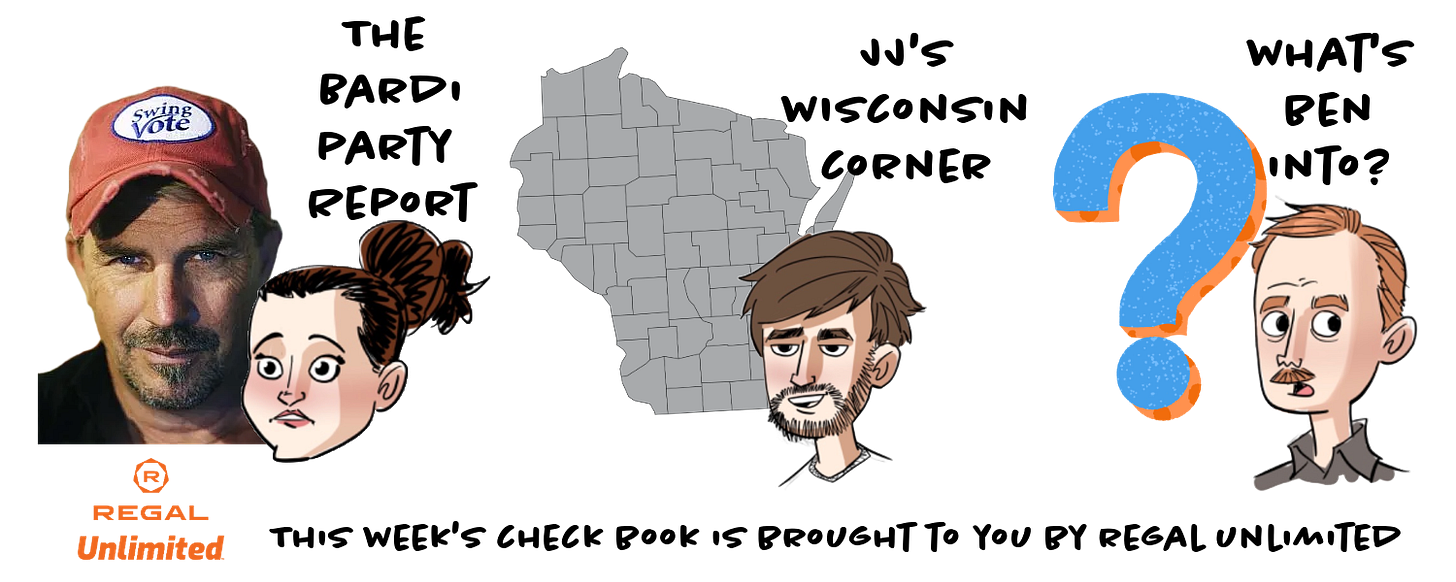
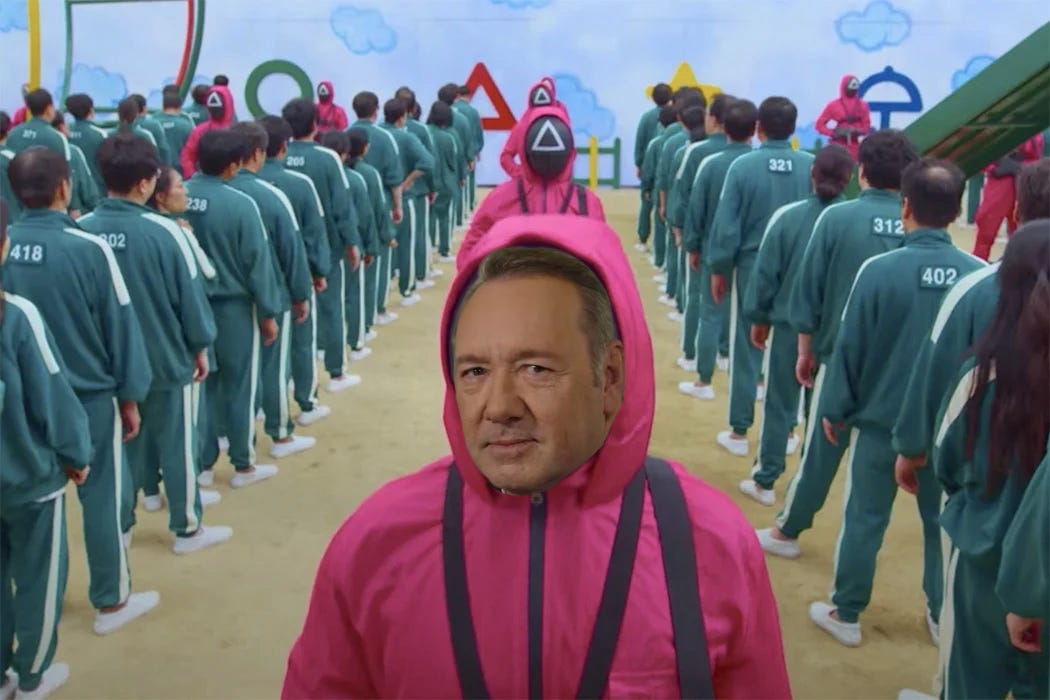
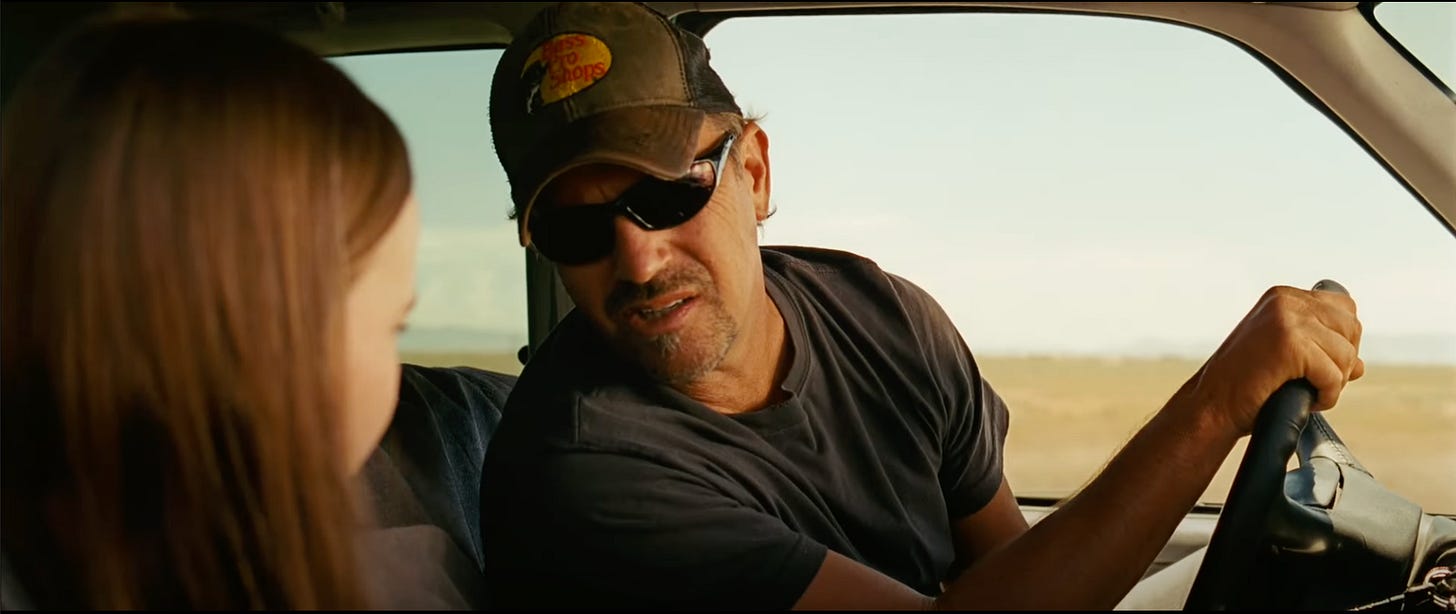
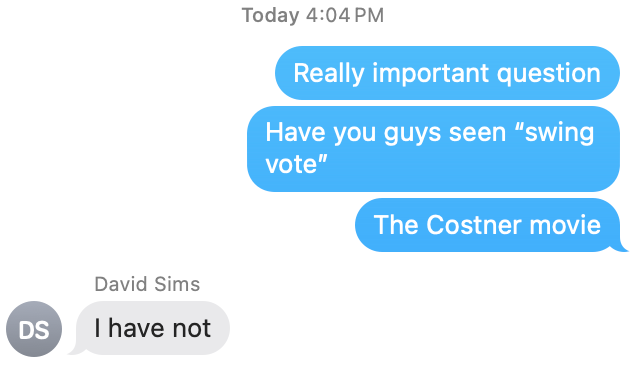

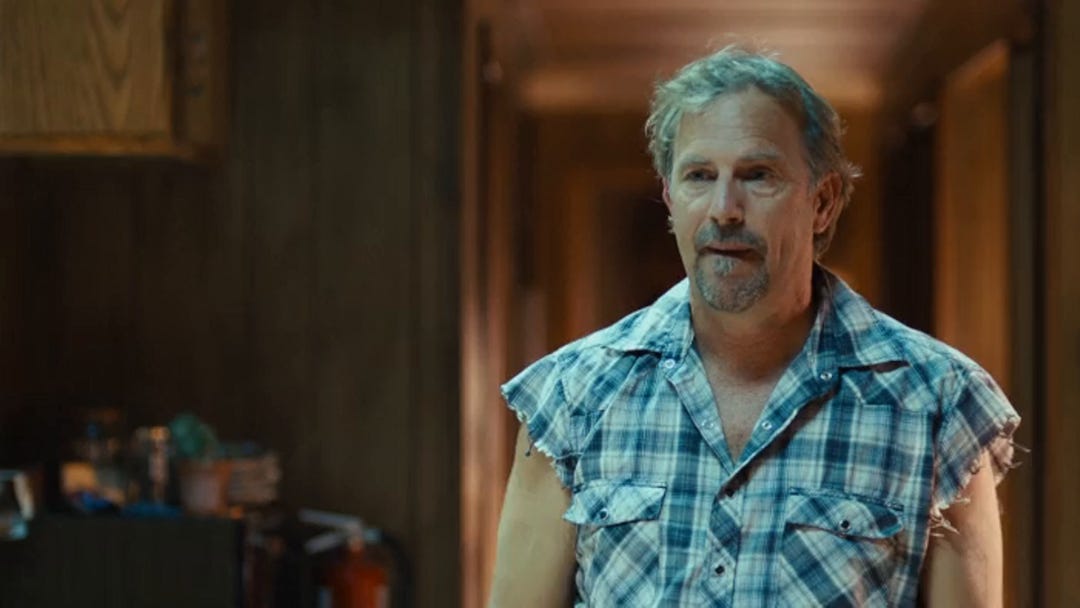

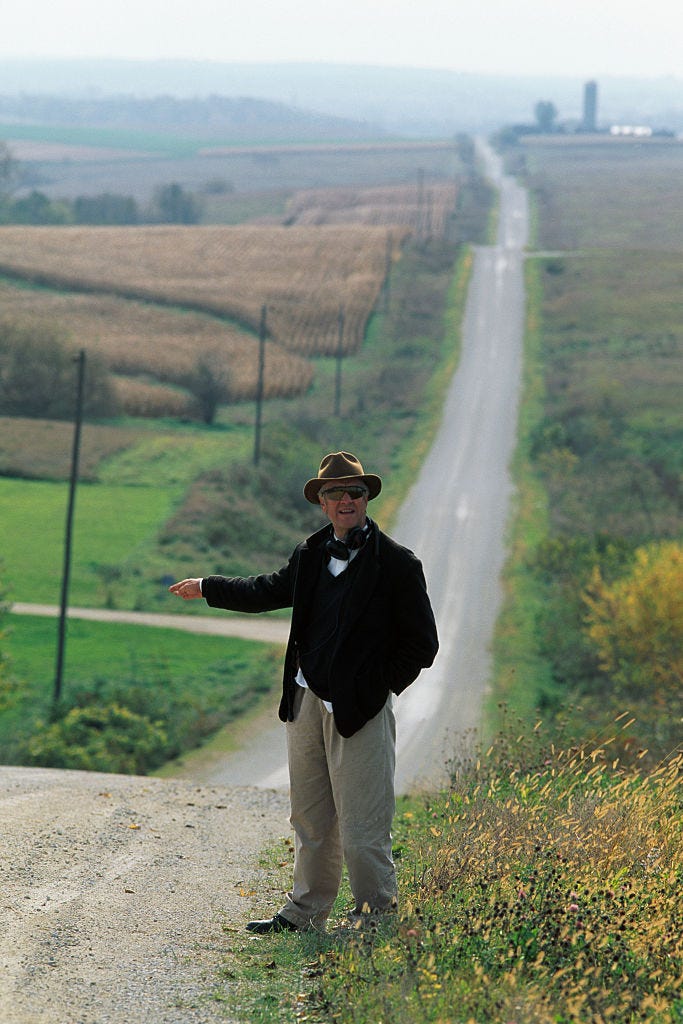




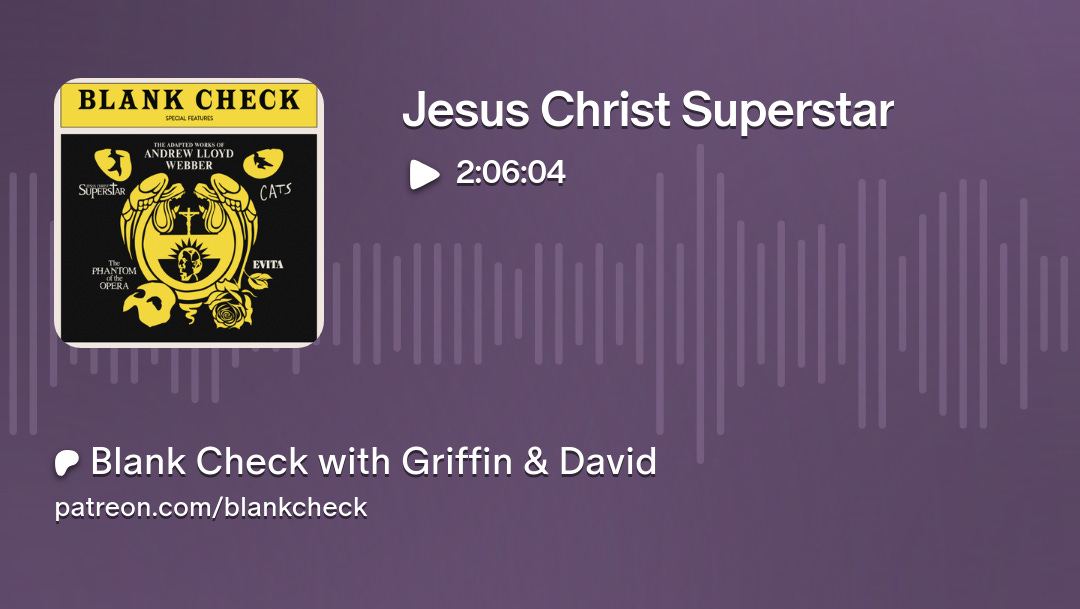


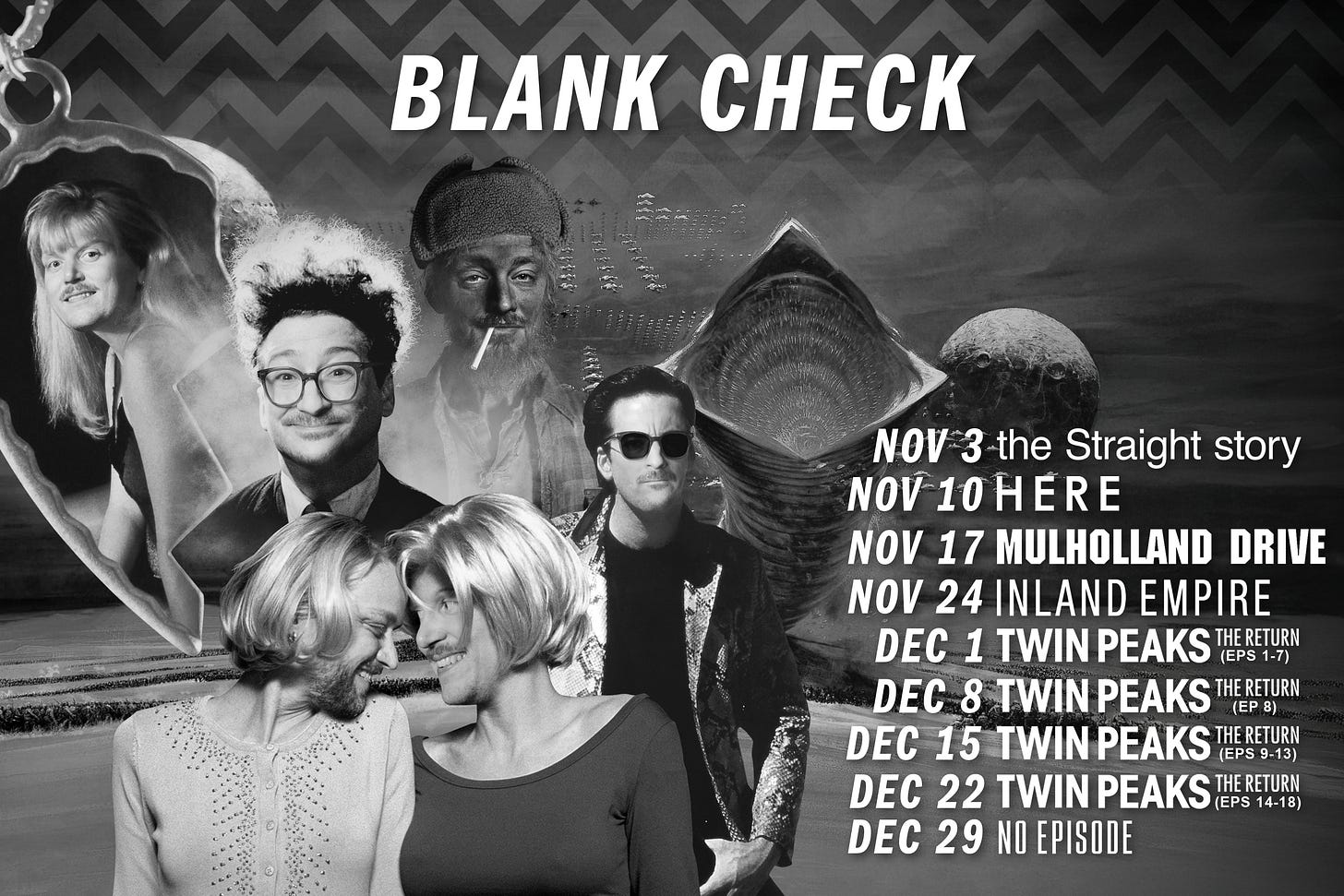
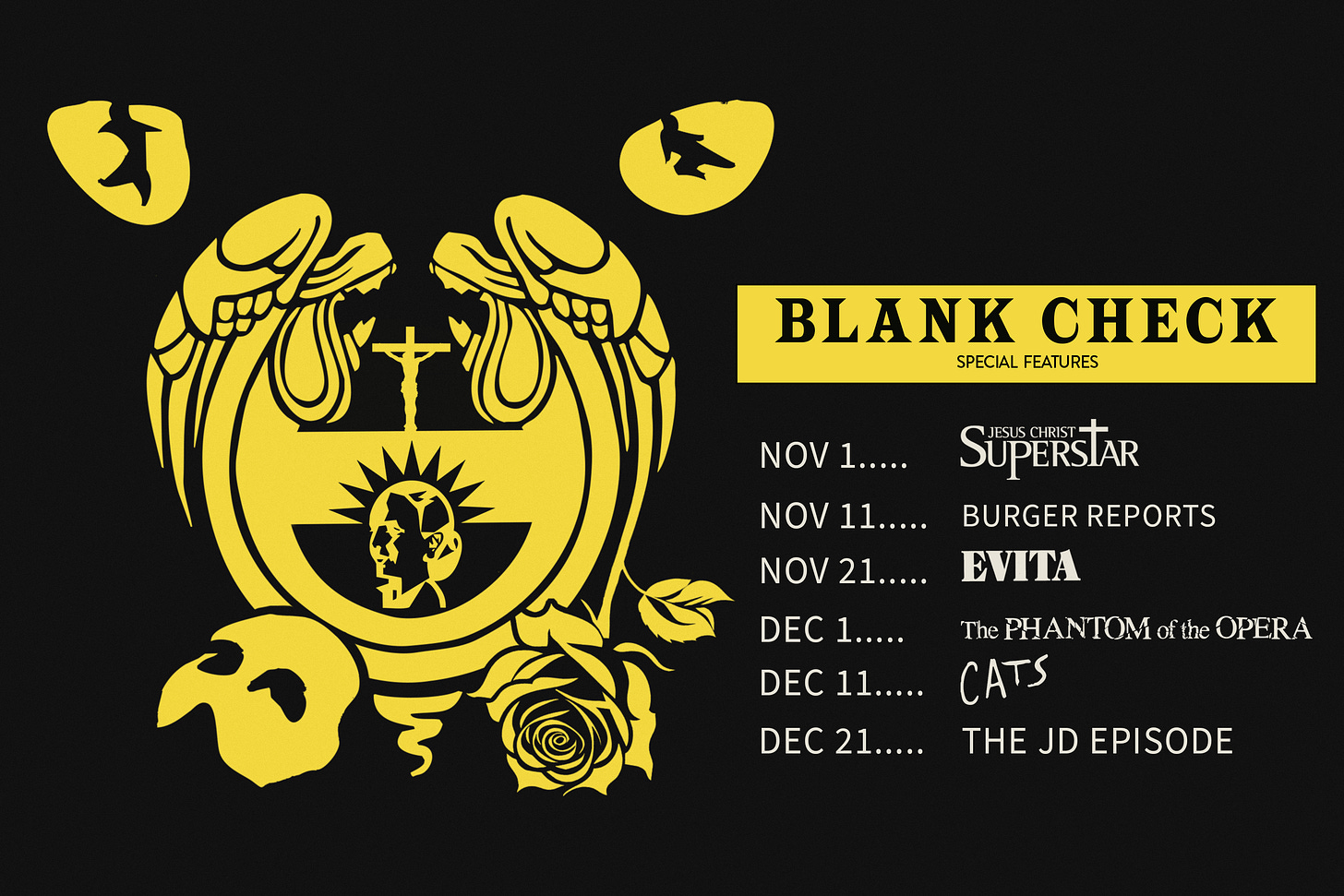
Wow it sounds like I really gotta check out this "Wisconsin"
I’m so pleased that JJ’s dossier notes will get a highlight in these (I’m always wondering about how much of these things even get into the episode).
Marie nailed this prose, I’m so excited to get these updates, heck I even download the substack app for this announcement!
Really interested in next week’s episode. I used my *new* Regal Unlimited membership (promo code BLANKCHECK) to check out Here last Friday. I was entertained, am interested in checking out the graphic novel, and wept when the “final moment” occurred in the cinema (I think I was just surprised after being atrophied in that same corner of the house for so long).